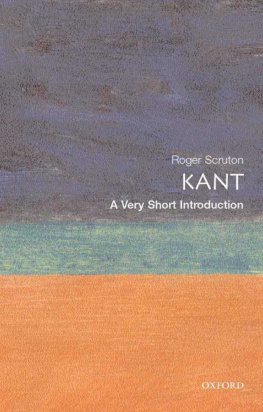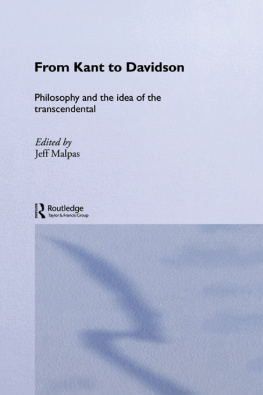Kant Immanuel - Fundamental Principles of the Metaphysic of Morals
Here you can read online Kant Immanuel - Fundamental Principles of the Metaphysic of Morals full text of the book (entire story) in english for free. Download pdf and epub, get meaning, cover and reviews about this ebook. genre: Science. Description of the work, (preface) as well as reviews are available. Best literature library LitArk.com created for fans of good reading and offers a wide selection of genres:
Romance novel
Science fiction
Adventure
Detective
Science
History
Home and family
Prose
Art
Politics
Computer
Non-fiction
Religion
Business
Children
Humor
Choose a favorite category and find really read worthwhile books. Enjoy immersion in the world of imagination, feel the emotions of the characters or learn something new for yourself, make an fascinating discovery.
- Book:Fundamental Principles of the Metaphysic of Morals
- Author:
- Genre:
- Rating:3 / 5
- Favourites:Add to favourites
- Your mark:
- 60
- 1
- 2
- 3
- 4
- 5
Fundamental Principles of the Metaphysic of Morals: summary, description and annotation
We offer to read an annotation, description, summary or preface (depends on what the author of the book "Fundamental Principles of the Metaphysic of Morals" wrote himself). If you haven't found the necessary information about the book — write in the comments, we will try to find it.
Fundamental Principles of the Metaphysic of Morals — read online for free the complete book (whole text) full work
Below is the text of the book, divided by pages. System saving the place of the last page read, allows you to conveniently read the book "Fundamental Principles of the Metaphysic of Morals" online for free, without having to search again every time where you left off. Put a bookmark, and you can go to the page where you finished reading at any time.
Font size:
Interval:
Bookmark:
The Project Gutenberg EBook of Fundamental Principles of the Metaphysic of Moralsby Immanuel Kant(#2 in our series by Immanuel Kant)
Copyright laws are changing all over the world. Be sure to check thecopyright laws for your country before downloading or redistributingthis or any other Project Gutenberg eBook.
This header should be the first thing seen when viewing this ProjectGutenberg file. Please do not remove it. Do not change or edit theheader without written permission.
Please read the "legal small print," and other information about theeBook and Project Gutenberg at the bottom of this file. Included isimportant information about your specific rights and restrictions inhow the file may be used. You can also find out about how to make adonation to Project Gutenberg, and how to get involved.
**Welcome To The World of Free Plain Vanilla Electronic Texts**
**eBooks Readable By Both Humans and By Computers, Since 1971**
*****These eBooks Were Prepared By Thousands of Volunteers!*****
Title: Fundamental Principles of the Metaphysic of Morals
Author: Immanuel Kant
Release Date: May, 2004 [EBook #5682][Yes, we are more than one year ahead of schedule][This file was first posted on August 7, 2002][Date last updated: November 5, 2005]
Edition: 10
Language: English
*** START OF THE PROJECT GUTENBERG EBOOK, FUNDAMENTAL PRINCIPLES OF THE METAPHYSIC OF MORALS ***
This eBook was prepared by Matthew Stapleton.
1785
by Immanuel Kant
translated by Thomas Kingsmill Abbott
Ancient Greek philosophy was divided into three sciences: physics,ethics, and logic. This division is perfectly suitable to the natureof the thing; and the only improvement that can be made in it is toadd the principle on which it is based, so that we may both satisfyourselves of its completeness, and also be able to determine correctlythe necessary subdivisions.
All rational knowledge is either material or formal: the formerconsiders some object, the latter is concerned only with the form ofthe understanding and of the reason itself, and with the universallaws of thought in general without distinction of its objects.Formal philosophy is called logic. Material philosophy, however, hasto do with determinate objects and the laws to which they are subject,is again twofold; for these laws are either laws of nature or offreedom. The science of the former is physics, that of the latter,ethics; they are also called natural philosophy and moral philosophyrespectively.
Logic cannot have any empirical part; that is, a part in which theuniversal and necessary laws of thought should rest on grounds takenfrom experience; otherwise it would not be logic, i.e., a canon forthe understanding or the reason, valid for all thought, and capable ofdemonstration. Natural and moral philosophy, on the contrary, can eachhave their empirical part, since the former has to determine thelaws of nature as an object of experience; the latter the laws ofthe human will, so far as it is affected by nature: the former,however, being laws according to which everything does happen; thelatter, laws according to which everything ought to happen. Ethics,however, must also consider the conditions under which what ought tohappen frequently does not.
We may call all philosophy empirical, so far as it is based ongrounds of experience: on the other band, that which delivers itsdoctrines from a priori principles alone we may call purephilosophy. When the latter is merely formal it is logic; if it isrestricted to definite objects of the understanding it is metaphysic.
In this way there arises the idea of a twofold metaphysic- ametaphysic of nature and a metaphysic of morals. Physics will thushave an empirical and also a rational part. It is the same withEthics; but here the empirical part might have the special name ofpractical anthropology, the name morality being appropriated to therational part.
All trades, arts, and handiworks have gained by division oflabour, namely, when, instead of one man doing everything, eachconfines himself to a certain kind of work distinct from others in thetreatment it requires, so as to be able to perform it with greaterfacility and in the greatest perfection. Where the different kindsof work are not distinguished and divided, where everyone is ajack-of-all-trades, there manufactures remain still in the greatestbarbarism. It might deserve to be considered whether pure philosophyin all its parts does not require a man specially devoted to it, andwhether it would not be better for the whole business of science ifthose who, to please the tastes of the public, are wont to blend therational and empirical elements together, mixed in all sorts ofproportions unknown to themselves, and who call themselves independentthinkers, giving the name of minute philosophers to those who applythemselves to the rational part only- if these, I say, were warned notto carry on two employments together which differ widely in thetreatment they demand, for each of which perhaps a special talent isrequired, and the combination of which in one person only producesbunglers. But I only ask here whether the nature of science does notrequire that we should always carefully separate the empirical fromthe rational part, and prefix to Physics proper (or empirical physics)a metaphysic of nature, and to practical anthropology a metaphysicof morals, which must be carefully cleared of everything empirical, sothat we may know how much can be accomplished by pure reason in bothcases, and from what sources it draws this its a priori teaching,and that whether the latter inquiry is conducted by all moralists(whose name is legion), or only by some who feel a calling thereto.
As my concern here is with moral philosophy, I limit the questionsuggested to this: Whether it is not of the utmost necessity toconstruct a pure thing which is only empirical and which belongs toanthropology? for that such a philosophy must be possible is evidentfrom the common idea of duty and of the moral laws. Everyone mustadmit that if a law is to have moral force, i.e., to be the basis ofan obligation, it must carry with it absolute necessity; that, forexample, the precept, "Thou shalt not lie," is not valid for menalone, as if other rational beings had no need to observe it; and sowith all the other moral laws properly so called; that, therefore, thebasis of obligation must not be sought in the nature of man, or in thecircumstances in the world in which he is placed, but a priorisimply in the conception of pure reason; and although any otherprecept which is founded on principles of mere experience may be incertain respects universal, yet in as far as it rests even in theleast degree on an empirical basis, perhaps only as to a motive,such a precept, while it may be a practical rule, can never becalled a moral law.
Thus not only are moral laws with their principles essentiallydistinguished from every other kind of practical knowledge in whichthere is anything empirical, but all moral philosophy rests whollyon its pure part. When applied to man, it does not borrow the leastthing from the knowledge of man himself (anthropology), but gives lawsa priori to him as a rational being. No doubt these laws require ajudgement sharpened by experience, in order on the one hand todistinguish in what cases they are applicable, and on the other toprocure for them access to the will of the man and effectual influenceon conduct; since man is acted on by so many inclinations that, thoughcapable of the idea of a practical pure reason, he is not so easilyable to make it effective in concreto in his life.
A metaphysic of morals is therefore indispensably necessary, notmerely for speculative reasons, in order to investigate the sources ofthe practical principles which are to be found a priori in our reason,but also because morals themselves are liable to all sorts ofcorruption, as long as we are without that clue and supreme canon bywhich to estimate them correctly. For in order that an action shouldbe morally good, it is not enough that it conform to the moral law,but it must also be done for the sake of the law, otherwise thatconformity is only very contingent and uncertain; since a principlewhich is not moral, although it may now and then produce actionsconformable to the law, will also often produce actions whichcontradict it. Now it is only a pure philosophy that we can look forthe moral law in its purity and genuineness (and, in a practicalmatter, this is of the utmost consequence): we must, therefore,begin with pure philosophy (metaphysic), and without it there cannotbe any moral philosophy at all. That which mingles these pureprinciples with the empirical does not deserve the name ofphilosophy (for what distinguishes philosophy from common rationalknowledge is that it treats in separate sciences what the latteronly comprehends confusedly); much less does it deserve that ofmoral philosophy, since by this confusion it even spoils the purity ofmorals themselves, and counteracts its own end.
Next pageFont size:
Interval:
Bookmark:
Similar books «Fundamental Principles of the Metaphysic of Morals»
Look at similar books to Fundamental Principles of the Metaphysic of Morals. We have selected literature similar in name and meaning in the hope of providing readers with more options to find new, interesting, not yet read works.
Discussion, reviews of the book Fundamental Principles of the Metaphysic of Morals and just readers' own opinions. Leave your comments, write what you think about the work, its meaning or the main characters. Specify what exactly you liked and what you didn't like, and why you think so.












